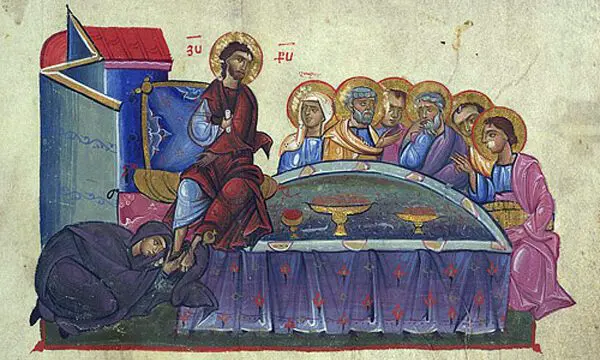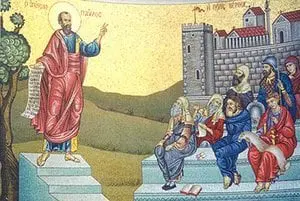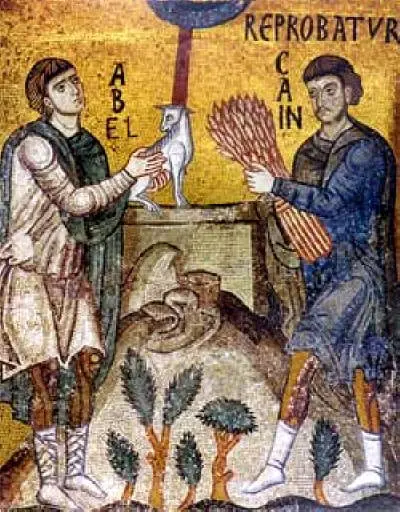By prof. A.P. Lopukhin
Acts. 2:26 a.m. Therefore my heart rejoiced, and my tongue rejoiced; and also my flesh shall rest in hope.
Acts. 2:27. Because You will not leave my soul in hell and You will not allow Your saint to see corruption.
“My flesh shall rest in hope, for Thou wilt not forsake,” in Greek ἡ σάρξ μου κατασκηνώσει ἐπ᾿ ἐλπίδι, ὅτι οὐκ ἐγκαταλείπεις τὴν ψυχήν μου. The Slavic translation is more accurate than the modern one: “my flesh is filled with hope, you did not leave it.” It should be said in a modern translation: “my flesh will dwell” (ie in the grave) “in hope, because You will not leave”. On the occasion of these words, blessed Theophylact notes: “since Jesus, perceiving death, put off that flesh which he assumed according to the plan of the household, in order to raise it again from death: it is fair [to say] that His flesh nourished by the hope of expected immortality’.
“Thou wilt not leave my soul in hell,” i. you will bring her out of hell again for life, which will be completely possible with the incorruption of the body – “you will raise her up” already for a new and better life (verse 28).
Acts. 2:28. You have given me to know the ways of life; You will fill me with joy through Your face.”
“Thou hast given me to know the paths of life; You will fill me with joy through Your face.” Blessed Theophylact writes: “It is not without reason that [the apostle] used these words when he mentions the resurrection, teaching that instead of sorrow [He] will be in eternal joy, and becoming passionless, unchangeable, and immortal in human nature; since God has always been such, it is not difficult for Him to make human nature a partaker of this soon after its formation in the mother’s womb, but suffered His adopted nature to pass through the path of suffering, so that He might thus , having destroyed the power of sin, to put an end to the torments of the devil, to destroy the power of death, and to give all men the opportunity of quickening. Therefore, as a man, he receives both incorruption and immortality.”
Acts. 2:29. Men brothers! May I be permitted to tell you boldly about the patriarch David, that he both died and was buried, and his tomb is with us to this day.
“Let me boldly tell you.” The apostle will speak of the greatest and most honored of the ancestors of the Jewish people as inferior to the Crucified Jesus, and for this reason he uses such a mild expression.
“died and was buried” – as an ordinary person, with whom nothing special or unusual happened after his death and burial, i.e. it is implied that he did not rise from the dead, which means that it was not on him that was fulfilled what was said about the righteous who will not remain in the grave.
“his grave is with us to this day”, i.e. the grave with the remains of his body, which is subject to decay like the bodies of all other men.
Saint John Chrysostom says, passing on to the further interpretation: “now he [Peter] proves what he needed. And then he still does not pass to Christ, but again speaks with praise of David…, so that his listeners, at least out of respect for David and his family, will accept the word about the Resurrection, as if otherwise their honor would suffer.”
Acts. 2:30. And being a prophet and knowing that God had promised him with an oath from the fruit of his loins to raise up Christ in the flesh and place Him on his throne,
“God promised with an oath.” This promise, fulfilled only upon the Messiah, is contained in 2 Kings. 7:12-16; cf. Ps. 131 In its essence, it is also a prophecy about the Resurrection, without which it could not be fulfilled.
“to place Him on his throne,” i.e. namely as the Messiah (cf. Luke 1:32). “As in many places of the Divine Scripture, so here throne is used instead of kingdom.” (blessed Theophylact).
Acts. 2:32. God resurrected that Jesus, of which we are all witnesses.
“His Jesus” – This one, not someone else, namely Jesus of Nazareth.
“of which we are all witnesses,” because we have seen Him, the Risen One, talked with Him, eaten with Him, touched Him, and by all this have been convinced of the reality of His resurrection, so that we may be entitled to testify about Him and to others .
Acts. 2:33. And so He, having been exalted to the right hand of God and having received from the Father the promise of the Holy Spirit, poured out what you now see and hear.
“And so, He, after being ascended to the right hand of God” – in Greek: τῇ δεχιᾷ οὖν τοῦ Θεοῦ ὑψοθεις, in Slavic: десницию убо Божиею вознесеся – an expression allowing for two interpretations: or “being ascended” to heaven by God’s right hand , in the same sense in which it is said above that God raised Him from the dead (verse 24); or “being taken up” ie. exalted to sit at the right hand of the Father in His glorified human flesh. Both interpretations are equal and equivalent.
“and received from the Father the promise of the Holy Spirit,” i.e. having received from the Father the authority to send to those who believe in Him the Holy Spirit, promised by the Father and proceeding from the Father.
Acts. 2:34. For David did not ascend into heaven; but he himself spoke: “said the Lord to my Lord: sit at my right hand,
Acts. 2:35. until I make Your enemies your footstool.”
After confirming the truth about the resurrection of Christ based on David’s prophecy, the apostle finds it necessary to also confirm the truth about the ascension of Jesus, the immediate result of which is the outpouring of the gifts of the Holy Spirit. This truth the apostle affirms by referring to the prophetic sentence of David in Ps. 109 (verse 1), attributing the fulfillment of these words entirely to Christ. The Lord Himself also applies this sentence to Himself in His conversation with the Pharisees (Matt. 22:42, etc.).
Acts. 2:36. And so, let the whole house of Israel know for sure that God has made Jesus, whom you crucified, Lord and Christ.
“the whole house of Israel,” i.e. the entire Jewish people.
“This Jesus, whom you crucified, God made Lord and Christ”, in other words: “God made it so that this Jesus, whom you crucified, is also your true Lord and Christ”, or Messiah (double designation of His messianic dignity – general and private).
“Whom ye crucified.” According to the remark of St. John Chrysostom, “the apostle admirably ends his speech in this way, that he may thereby shake their souls.”
Acts. 2:37. When they heard this, their hearts were moved, and they said to Peter and the other apostles: what shall we do, men and brothers?
“their heart became tender” – the listeners of the Apostle Peter fell into heartbreak, because they had done this with the Messiah and showed readiness in their hearts to erase their guilt with faith in Him, which is why they ask further: “what shall we do? “
“men, brothers” – full of trust, respect and love address of the apostles, on whose behalf Peter speaks.
Acts. 2:38. And Peter said to them: repent, and let each one of you be baptized in the name of Jesus Christ, for the forgiveness of sins; and you will receive the gift of the Holy Spirit.
For reconciliation with God and the unaccepted Messiah, Peter offers repentance and baptism, with their blessed fruits – forgiveness of sins and receiving the gifts of the Holy Spirit.
“everyone… to be baptized in the name of Jesus Christ”. According to the interpretation of blessed Theophylact, “these words do not contradict the words “baptizing them in the name of the Father and the Son and the Holy Spirit” (Matt. 28:19), because the Church thinks of the Holy Trinity as indivisible, so because of the unity of the three hypostases in essence, the one who is baptized in the name of Jesus Christ is baptized in the Trinity, since the Father, the Son and the Holy Spirit are inseparable in essence”. It is obvious that when the apostle calls for baptism in the name of Jesus Christ, he only indicates with this the basic content of our faith and confession, which conditions the recognition of everything that was discovered by the Son of God who came to earth.
Acts. 2:39. For the promise is to you, to your children, and to all who are far off whom the Lord our God would call.
“for you . . . and for your children,” i.e. of posterity in general, “and for all distant,” i.e. for those who stand in the remotest degrees of kinship and affinity with the Jewish people. Here we may also think of the Gentiles, of whom the apostle speaks covertly, sparing the weakness of the Jews, who might see something seductive in giving the Gentiles an equal share in the Messiah’s kingdom. This matter should have been resolved from the very beginning; here, however, everything that could cast a shadow on the dignity of the new truths being preached had to be avoided.
“whom the Lord our God would call.” The Lord calls all, desires salvation for all; obviously, here are meant those who, responding with their free will to the Lord’s call, fulfill their calling in action by repenting and accepting baptism in the name of Jesus Christ.
Acts. 2:40: And with many other words he testified and invited them, saying: be saved from this wicked generation.
“And with many other words”, which the author does not cite, presenting only the main content of what the apostle Peter said.
“save yourselves from this wicked generation.” In Greek: σώθητε ἀπὸ τῆς γενεᾶς τῆς σκολιᾶς ταύτης. It is more accurate to say: be saved from the modern wicked, obstinate human race (σκολιός means crooked, and then cunning, crafty), from God’s judgment and punishment awaiting those people who by their obstinacy have come to reject the Messiah and His work, and not to believe in Him. This admonition of the apostle is also applicable to all subsequent times, pointing out the need for all Christians to be saved from the world lying in evil by pure faith in Christ and living according to that faith.
Acts. 2:41 a.m. And so those who gladly accepted his words were baptized; and about three thousand people joined that day.
“were baptized.” As there is no water so abundantly collected in Jerusalem and its immediate vicinity that so many people can be baptized by immersion at once, we may suppose that the baptism itself followed a little later, individually for each, in homes, or in groups with more or less sufficient reservoirs, by one of the apostles and disciples of the Lord.
Acts. 2:42. And they persisted in the teaching of the apostles, in communication, in the breaking of bread and in prayers.
“And they persisted.” In Greek: ἦσαν δὲ προσκαρτεροῦντες, the Slavic translation is more accurate than the modern one: they were patient, literally – they were tireless in the teaching of the apostles, etc.
Of course, it is difficult to suppose that all this mass of people (3,000 people, besides the previous considerable number of believers) assembled in one place or in one house. It is more likely that the believers, divided into several groups or communities, gathered in several places where the apostles taught them the new truths, prayers and sacraments. Between all these communities there existed the closest communication, which united them in one fraternal family, whose soul was the apostles.
“in the breaking of bread.” In Greek: τῇ κλάσει τοῦ ἄρτου. this expression usually means eating food (Luke 24:30, etc.), but at that time it was also used in another, higher sense – as performing and participating in the sacrament of the Eucharist (1 Cor. 10:16). Both meanings can be implied here, both separately and together, especially since this was a time when the Eucharist was usually a supper of love, with the participation of all the faithful, in a spirit of fraternal equality, love and mutual communication. This is how the main characteristics of the original Christian worship, separate and independent from the Old Testament worship, are outlined: teaching, breaking of bread (Eucharist) and prayers, although the apostles and other believers do not sever the connection with the Old Testament temple and its services (Acts 3:1 and etc.).
Acts. 2:43. Fear gripped every soul, because many miracles and omens were happening through the apostles in Jerusalem.
“Fear fell upon every soul,” i. the soul that does not believe. The unexpected and astonishing manifestations of divine power, the extraordinary success of Peter’s preaching, his fervent warnings and sermons, the miracles and signs of the apostles – all this could not fail to startle the impressionable soul and plunge it into deep reflection.
Acts. 2:44. And all the believers were together, and they had everything in common;
“were together.” In the Greek text: ἦσαν ἐπὶ τὸ αὐτὸ. The Slavic text of this verse, compared to the Greek original and the Russian translation, has an additional line (repeating the beginning of verse 43): “a great fear was upon all of them. Все се верующие были вместе” (All believers were together”), i.e. gathering in certain places (cf. Acts 1:14, 2:1), for teaching and prayers, all together formed a united family, with strong brotherly love and fellowship.
“they had everything in common.” The distinguishing feature of the first Christian fraternal family or community was the sharing of property, which was neither forced nor legal, but entirely voluntary, due to the sublime impulse of the living faith and brotherly love of the first Christians among themselves. There was no destruction of the right of property (cf. Acts 5:4), but a completely voluntary distribution or relinquishment of that right, wholly and privately, in favor of others in need.
How long this distinctive feature of the first Christian communities persisted is not known; in any case, the traces of it are lost in history very soon. It can be considered that the disappearance of this feature and its removal is due to the significant difficulties that the rapid growth and multitude of Christ’s followers gave rise to (cf. Acts 6:1).
Acts. 2:46 a.m. And every day they unanimously stayed in the temple and, breaking bread from house to house, they ate with a cheerful and pure heart,
“every day with one accord they stayed in the temple,” i.e. attended the Jewish temple service, “because, as St. John Chrysostom says, they had not yet rejected anything Jewish; and the very respect for the place was transferred to the Lord of the temple”…. The whole temple service contained at its core and embodied the aspiration to the Messiah; this made this service useful also for the Christians, who differed from the Jews in this case only in that they believed not in the Advent, but in the Messiah who had already come.
“breaking bread from house to house.” In the Greek original: κλῶντές τε κατ᾿ οἶκον ἄρτον. The expression κάτ’ οῖκον allows one to say both “in the houses” (different, several) and “in the house” (one). Both have their reasons (cf. v. 42), depending on the multitude of those gathered and the capacity of the meeting place
“they ate with a cheerful and pure heart.”
Cf. Acts. 2:12 and Acts. 20:7 – 11. From these passages it can be concluded that in the earliest times of Christianity there were two kinds of love suppers (αγάποι): those which were held in different houses and therefore by separate societies of believers ( chiefly in Jerusalem), and those which on certain days, namely, Sundays, were held by the whole assembly of the faithful. The dinner opened and ended with prayer and washing of hands. During the dinner itself, psalms and other sacred songs were sung, excerpts from the Holy Scriptures were read and interpreted.
In the beginning, the evenings of love were very common and, together with the Eucharist, took place too often, almost daily. But even in the first centuries of Christianity there were churches in which no traces of these evenings could be seen. St. Justin Martyr, speaking of the performance of the Eucharist and the services of the Roman Christians of his time, does not mention agapi. St. Irenaeus of Lyons also says nothing about them. With the spread of Christianity, the initial life of Christians, having a family character, more and more took on the vast dimensions of public, ecclesiastical-folk life. This led to the disappearance of the original agapes because of the inevitable undesirable abuses and irregularities mixed with them.
Acts. 2:47. praising God and being loved by all the people. And the Lord daily added to the church those who were saved.
“as they praised God” is a general designation of the exalted religious mood of the spirit of the first Christian society (Luke 24: 53).
“being beloved by all the people”—no doubt because of their strict religiosity, pure life and virtues, peaceful and joyful benevolence towards all.
“The Lord daily added to the church those who were being saved.”
Here, the growth of Christ’s Church appears not as a work of the ordinary development and growth of a society, but as a direct work of the Lord Himself, who invisibly governs His Church.
Source in Russian: Explanatory Bible, or Commentaries on all the books of the Holy Scriptures of the Old and New Testaments: In 7 volumes / Ed. prof. A.P. Lopukhin. – Ed. 4th. – Moscow: Dar, 2009, 1232 pp.







